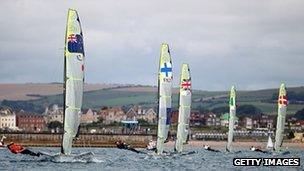Portland's Olympic venue rises from ashes of its naval past
- Published

Weymouth and Portland will host the sailing events during the 2012 Olympics
With six months to go until the start of the London 2012 Olympics, the timetable is looking good for the Dorset-based sailing events.
Weymouth Bay and Portland Harbour was the first Olympic venue to be finished, a new £90m relief road has opened, and a marina has been built in time for the Games.
But can the area's re-invention as a marine centre of excellence replace its proud naval past?
For 150 years Portland was home to a naval base which played a crucial role during World War I and World War II.
Before defence cuts led to its closure in 1999, it had 4,500 employees, in a town of 65,000 people.
Luxury yacht
Simon Williams, head of Portland and Weymouth 2012 Operations, said the outlook for the area was much now better than originally feared.
"When the naval base first closed, we had academics predicting 16% unemployment," he said.
"It's never been anything like that.
"The main problem is we don't have the same opportunities as we did when the naval base was here, but that's why we are working with businesses in the area such as Sunseeker."

The former Royal Naval Air Station Portland, otherwise known as HMS Osprey, was closed in 1999
Mr Williams said he would also invite entrepreneurs to Olympic sailing events in the hope of boosting investment in the area.
Since the former naval base was sold to Portland Harbour Authority Limited (PHAL) in 1998 it has become a commercial port used by cruisers and yachts.
The former Royal Naval Air Station Portland, otherwise known as HMS Osprey, was closed in 1999, and later became the Olympic sailing academy.
Old helicopter maintenance buildings in the area have been taken over by Sunseeker, the luxury yacht maker, whereas the former Admiralty underwater weapons establishment (AUWE) has been adopted by businesses and a £10m business hotel.
A new marina has been built adjacent to the sailing academy, called Osprey Quay after the former naval base, in time for the Olympics.
'Dire consequences'
Tourism is set to be given a boost by a £3m observation tower in Weymouth which will give views of the Jurassic coast on a revolving platform.
"People were predicting dire consequences when the navy moved out and the Admiralty research buildings closed down, but it's remarkable how resilient the area has been," says local historian Stuart Morris.
"The whole place could have become run down and derelict, but other things have filled the vacuum."
However, people living locally say the Olympics has created traffic problems over the past two years which have deterred tourists.
Roadworks, now completed, have been in place in Weymouth to replace roundabouts with "intelligent" traffic lights.
Dave Price runs the Molyneux Guest House and is chairman of the Weymouth Hotel & Guesthouse Leaseholders Association.
He said: "I think the Olympics have been good for Portland because we've got Osprey Quay and the relief road, but the last two years we've had traffic problems which have put people off coming here.
"No-one's seeing the influx of tourists for the Olympics that we were promised. Our bookings are down on last year."
- Published13 September 2011
- Published17 March 2011